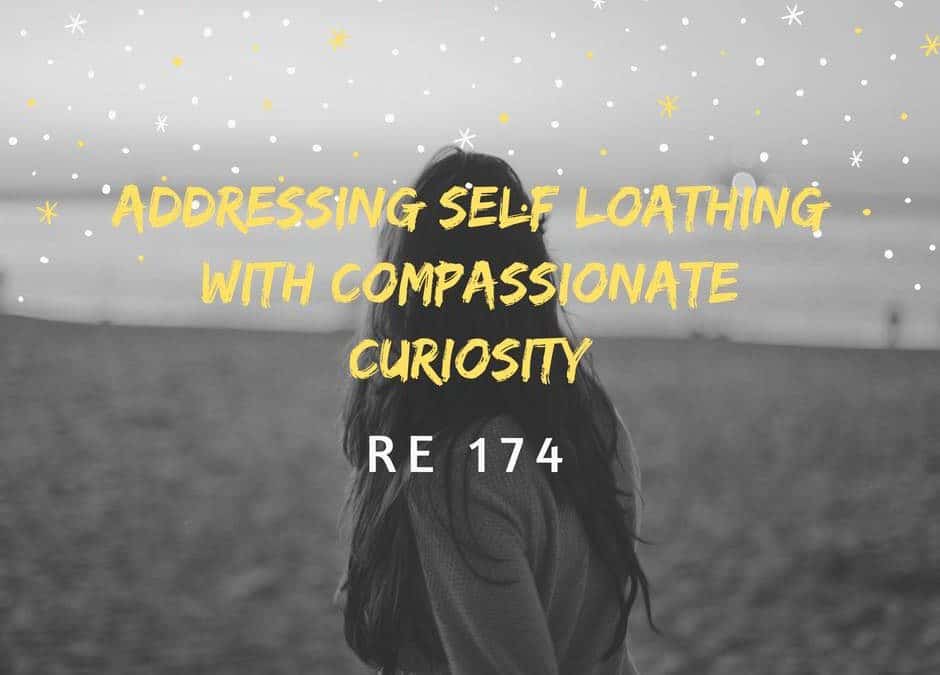
by Paul Churchill | Jun 18, 2018 | Podcast
Podcast: Play in new window | Download
Subscribe to the Recovery Elevator Podcast Apple Podcasts | | More
Compassionate Curiosity: a way we can get to the root of why we drink.
“The problem’s not that the truth is harsh, but that liberation from ignorance is as painful as being born. Run after truth until you’re breathless. Accept the pain involved in re-creating yourself afresh.” – Naguib Mahfouz
One of the biggest root causes of addition is self loathing. Feeling like we are not worthy or that we are in any way less than others is a belief often found at the center of our addictive behavior.
The cure for self loathing is self compassion, or self love. Replacing the habit that is self judgment with forgiveness, the mental rigidity with an intention of being open, or the repetitive criticism with positive messages that we can do this are some of the first steps toward distancing ourselves from addictive tendencies.
We begin with a process of self examination, wherein we compassionately do so without judgment.
“There is no moving forward without breaking through the walls of denial.” -Gabor Maté
Kim, with 1½ years since her last drink, shares her story…
SHOW NOTES
[1:30] Paul Introduces Kim.
Kim is 37 years old from Arkansas. She’s been sober over 1½ years. She’s married with 3 kids. She works as a counselor. She enjoys her spending with her family, reading, and Kintsugi.
[6:05] When did you first realize you had a problem with drinking?
She experienced complications with her pregnancy. With that came a prescription of pain medication. After she went through the pain meds, she noticed that she couldn’t stop drinking.
[9:06] Did you try to put any rules into place?
From her work with addiction, she knows that putting rules into place is addictive behavior. She was probably going through a half gallon of vodka per week. She attempted to quit throughout 2017.. nothing really stuck.
[10:35] What were some lessons you learned in your previous attempts to quit?
She has a stubborn personality. When she tried to quit using her will power, she failed. It scared her. She started researching different podcasts, and found Recovery Elevator. She was worried that she couldn’t do it alone. She began to find other stories and realized that she was on a slippery slope.
[13:20] How were you able to quit successfully?
She realized that she needed to remove triggers. She tried to eliminate stress. She hired someone to help her with small duties.
[15:50] How are you able to maintain professional distance in your job working with addicts?
When you work in a field where you give to others, you have to make sure that you are ok first. You have to give to others what you can spare, not what you need.
[17:00] Walk us through the early days of your recovery.
The first month was difficult. She had lots of cravings. She tried to keep the memory of her difficult year close. She would use the brainspotting technique. She knows people can relapse after years and years. The addiction waits to see where the hole is, and that’s where it gets you.
[23:50] Are you able to be open about your own recovery with patients?
Reaching out to Paul helped her realize how she was in denial about her addictions. She shares her recovery experience with some patients, and it’s been much more helpful.
[24:40] What are the common hangups that your patients have?
The biggest struggle is the stagma and the shame. Also, the surrendering to higher power.
[27:10] What is the biggest thing you’ve learned about yourself?
She needs to show herself the same compassion that she gives to everyone around her.
[27:40] What has been your proudest moment in sobriety?
Sharing with her clients. Showing them that she also struggles with different things.
[28:28] What are you looking forward to in Peru?
Seeing the beauty, and being a part of a recovery community.
[29:10] Rapid Fire Round
- What was your worst memory from drinking?Pre-parent: 17yo, on vacation with family in Mexico. Parents lied about her age so she could drink at the resort. She hung out at the bars. On the last night, she was sexually assaulted.As a parent: She used to drank in front of her young child. Her child began to copy her drinking behavior by drinking his water in a small cup with a straw.
- Did you ever have an “oh-shit” moment?
- What’s your plan moving forward?She would like to be a voice for recovery with mental health professionals.
- What’s your favorite resource in recovery?Her faith is strong and it helps her in her darkest moments.
The Miracle Morning. She does it daily no matter what.
Recovery Elevator podcast. She looks forward to listening weekly.
- What’s the best advice you’ve ever received (on sobriety)?You can’t do this alone. The magic happened when she reached out.
- What parting piece of guidance can you give listeners who are in recovery or thinking about quitting drinking?A quote by Carl Jung.. “What you resist, persists. What you can feel, you can heal.”
- You might be an alcoholic if…While listening to someone else’s story you think to yourself that you need to remember it in case you relapse.
Resources mentioned in this episode:
Audible is offering my listeners a free audiobook with a 30-day trail membership. Go to audible.com/elevator and start listening. Or text ELEVATOR to 500-500.
In the Realm of the Hungry Ghosts – a book by Gabor Maté
When Things Fall Apart – a book by Pema Chodron
The Miracle Morning – a book by Hal Elrod
Kintsuji – The japanese artform of “golden joinery”.
Brainspotting – a theraputic technique
Connect with Cafe RE– Use the promo code Elevator for your first month free
Sobriety Tracker iTunes
Sobriety Tracker Android
Sober Selfies! – Send your Sober Selfie and your Success Story to info@recoveryelevator.com
“We took the elevator down, we gotta take the stairs back up, we can do this!”
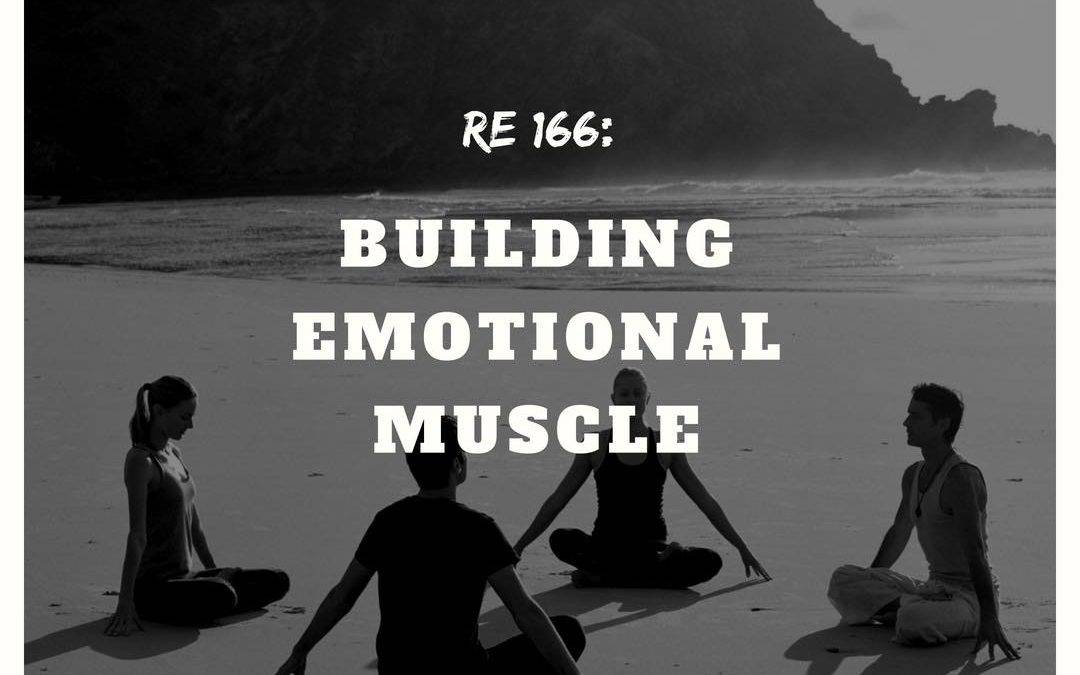
by Paul Churchill | Apr 23, 2018 | Podcast
Podcast: Play in new window | Download
Subscribe to the Recovery Elevator Podcast Apple Podcasts | | More
A quote from “Drinking: A love Story” by Caroline Knapp sums up the theme for today’s podcast:
“Early sobriety has the quality of vigorous exercise, as though each repetition of a painful moment gone without a drink serves to build up emotional muscle.”
Life will happen. We can’t control what challenges life will send our way but we can control how we respond. Each passing trial is an opportunity to build one’s sobriety muscles, which get stronger over time as healthy habits and ways of thinking become more deeply ingrained.
Quitting drinking is difficult because not only is alcohol physically addicting, but we often turn to alcohol to help us cope with life’s many challenges. In sobriety, we find an opportunity to learn new coping skills and rewire our brain to handle difficult times without turning to alcohol for help.
Samantha, with 18 days since her last drink, shares her story…
SHOW NOTES
[7:20] Paul Introduces Samantha.
Samantha is 27 years old, from Louisiana. She has a girlfriend and a cat, works at a lawfirm, likes music, travel, reading and listens to podcasts. She’s a geography student, returning to school to finish her degree.
[8:30] When did you first notice that you had a problem with drinking?
In her early 20s. She used alcohol to deal with her anxiety. She thinks alcohol is a big part of society in Louisiana. She has family members that struggle with alcohol. An abusive relationship drove her to drinking more than normal. All of her friends seemed to drink a lot.
[12:35] What did drinking a lot look like for you?
Mostly just wine, and eventually whiskey, which became her alcohol of choice.
[13:07] Did you ever put any rules into place to try and control your drinking?
Yes, she would buy smaller bottles or only drink on weekends.
[13:50] What was your rock bottom moment? Why did you decide to quit?
Sick and tired of being sick and tired mostly. A therapist refused to see her while she was drinking. She was angry. She refused the rehab and kept drinking. A different time she had written in her journal about quitting drinking, only to go out later that night and black out again.
[18:34] What was it like to break that promise to yourself?
She woke up and felt terrible, shameful, embarrassed.
[19:55] How has sobriety affected your borderline personality disorder?
Her emotions are normally intense and fleeting. Alcohol helped her maintain an even keel. Without alcohol, she’s switched to Zoloft. It’s difficult to deal with strong emotions without alcohol. She’s now optimistic about her future and has decided to go back to school, realizing that alcohol was getting in her way.
[23:40] How has your behavior changed since you’ve quit?
She goes to bars less. She is looking for more things to do at home. She’s trying to fill the void left by alcohol with healthy activities.
[24:40] Is your partner trying to get sober?
No, she wants to stop but she is continuing. It’s difficult to see her continue, not because it makes her want to drink, but because she sees the effect alcohol is having on her.
[27:06] What benefits are you getting from quitting?
Her skin cleared up. She’s lost weight. Her emotions are easier to handle. She’s now able to see that one drink may start well but it will lead to a terrible conclusion.
[30:27] Have you lost anything to alcohol?
She feels like she lost her dignity. Various memories from drinking make her feel shameful or embarrassed.
[32:30] What advice would you give to your younger self?
Not to smoke or drink ever! She received info about substances while in school, but feels like it had no impact. She would tell herself to love herself. She thinks loving oneself is the root of many of the decisions we make.
[35:04] What is your proudest moment so far in sobriety?
She was told that she was a great student by an old professor. Also, she went to a bar and didn’t have any drinks.
[36:30] Rapid Fire Round
- What was your worst memory from drinking?During a flood in 2016, she was caught in a flash flood and had to be rescued while drunk.
- Did you ever have an “oh-shit” moment?Her gf showed her a picture of her sleeping on the ground.
- What’s your plan moving forward?She is going to connect with and stay close with sober friends. She will focus on her goals.
- What’s your favorite resource in recovery?Other sober people. Podcasts: Recovery Elevator, The Mental Illness, Happiness Hour, Crazy in Bed, Your own Magic,
- What’s the best advice you’ve ever received (on sobriety)?Keep your goals in front of you. You can always go back to drinking.
- What parting piece of guidance can you give listeners who are in recovery or thinking about quitting drinking?Any amount of time drinking is a win. If you mess up, don’t beat yourself up about it.
- You might be an alcoholic if…“You get drunk at 10am at your grandmother’s birthday party.”
Resources mentioned in this episode:
Drinking: A Love Story – By Caroline Knapp
The Subtle Art of Not Giving a F*ck – by Mark Manson
Connect with Cafe RE– Use the promo code Elevator for your first month free
Sobriety Tracker iTunes
Sobriety Tracker Android
Sober Selfies! – Send your Sober Selfie and your Success Story to info@recoveryelevator.com
“We took the elevator down, we gotta take the stairs back up, we can do this!”
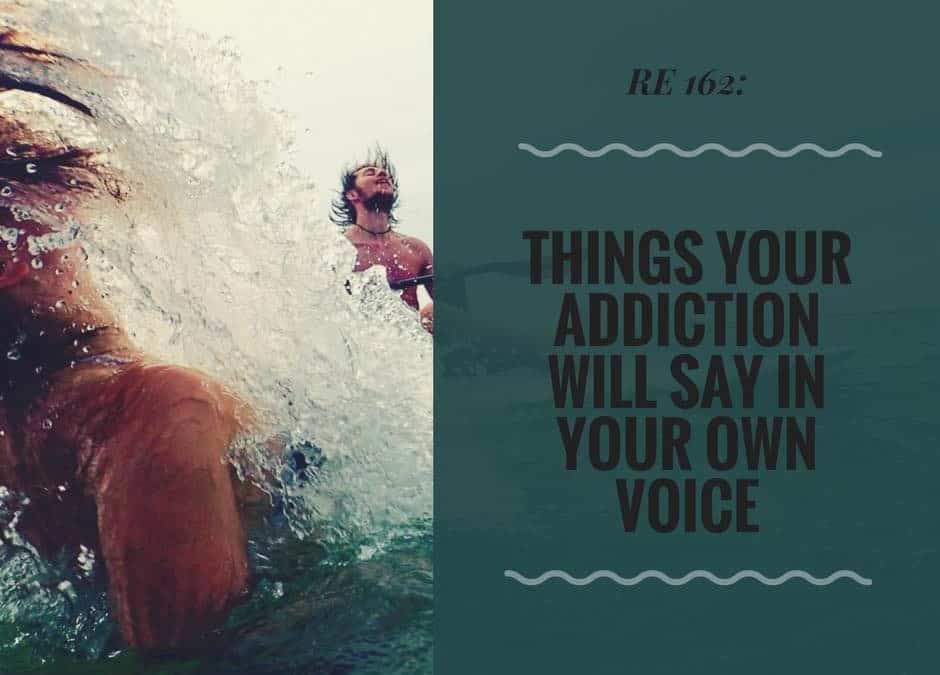
by Paul Churchill | Mar 26, 2018 | Podcast
Podcast: Play in new window | Download
Subscribe to the Recovery Elevator Podcast Apple Podcasts | | More
“Your addiction will lie to you in your own voice.”
Your addiction will often appear to you as a voice in your head that sounds like your own rational thoughts. It will tell you that it’s not really that big of a deal, that you are really in control or, in many cases, will conveniently wipe your memory (the ISM or “incredibly short memory”) so you won’t recall what a tough time you had getting through that last hangover.
Be on the lookout for justification phrases such as:
“But I didn’t really have a problem before”
“Everyone else drinks like I do”
“This next time will be different”
“I’ve quit once, I can quit again”
“The only person you’re negatively affecting is yourself”
“I’m cured! I just went [X amount of time] without drinking!”
“Everyone else is having so much fun”
“I got this.”
Stay vigilant in protecting your subconscious mind from thoughts like these and you will have an easier time avoiding relapse. It’s much easier to stay sober than it is to get sober, and staying sober isn’t always easy.
Mike, with almost two years since his last drink, shares his story
SHOW NOTES
[8:05] Paul Introduces Mike.
Sober over 600 days. 37 years old, from California. A professional musician that has worked in California, Boston and around China, as well. He now lives with his girlfriend in Hong Kong. Mike does for the show notes for each podcast episode.
[11:10] You quit drinking and smoking at the same time?
Yes. Smoking was getting in the way of his singing. He read Allen Carr’s “Easy Way To Quit Smoking” and at some point he realized that he wouldn’t be able to quit smoking without quitting drinking. He committed to 30 days. Felt great so he kept going.
[13:58] When did you realize you were going to have to quit drinking also?
When he moved in with his girlfriend. He realized that his actions were having consequences that were affecting other people, and that if he really cared about this person and himself, he would have to clean up his act.
[15:45] What were the indicators that you had a problem with drinking and/or smoking?
He had a therapy session, and the therapist helped him realize that his problem was the drinking, and not what he had thought.
[18:27] At that point, did you attempt to quit or moderate?
Yes. Upon advice from his father, he tried to moderate his drinking by only drinking during work hours. It was a form of torture as his whole day became centered around waiting for work to begin. Eventually it lead to him breaking the rule and drinking all day for weeks.
[20:23] So the willpower technique was torture?
Yes. While the rules were in place he found himself constantly distracted and thinking about drinking. His brain was hijacked by both tobacco and alcohol.
[22:40] How did you get through those difficult cravings after you quit?
He started learning martial arts, and it gave him the tools he had been missing. Previously, he had been using alcohol to relax intense feelings of anxiety or discomfort, but now he was able to use the techniques that he learned at the martial arts classes.
[24:25] Was everyone kung fu fighting?
In Hong Kong, not as much, but globally, yes.. more people are practicing Kung Fu now than ever before.
[26:54] What do you do when the uncomfortable feelings or cravings come?
He focuses on the physical sensations of the craving. He tries to keep his body from becoming static, and thus paralyzed by the craving. He breathes, moves, walks, gets fresh air, whatever is necessary to keep the craving from tensing him up.
[29:19] What is it like to continue working in the nightlife now that you’re sober?
When you’re still drinking, even the thought of trying to quit seems like an insurmountable task, but once you’ve quit and, inevitably, you change the way you see things, the environment in which you were in before is not what it seemed.
[32:30] What’s on your sobriety bucket list going forward?
He’s interested in the physical activities he always turned down while he was drinking and smoking. He wants to travel more and say yes to the things he said no to in the past.
[34:05] What is it like to not have the addiction causing you to feel unsolicited fear?
It’s liberating. There are so many positive experiences to be had in life. Sobriety is an opportunity that begets other opportunities.
[34:53] What is it like to be in recovery in Hong Kong?
He knows someone who has been to AA in Hong Kong but he hasn’t been to any meetings himself, yet. He found solace in online resources, and he considers his online communities to be his recovery community.
[37:10] Rapid Fire Round
- What was your worst memory from drinking?
A really bad hangover in which he could barely function.
- Did you ever have an “oh-shit” moment?
His skype call with the therapist during which she pointed out that his main problem was probably drinking. Before that conversation with her, he had asked his friends about his drinking and they had all reassured him that it was normal. She was the first one to point out that it was probably the cause of his issues.
- What’s your plan moving forward?To continue to set my priorities on health, not overdoing it, to take it a day at a time, never say that “I got this”, to stay vigilant and positive.
- What’s your favorite resource in recovery?The Recovery Elevator podcast, That Sober Guy podcast, Belle’s One Minute Message podcast. The Allen Carr books.
- What’s the best advice you’ve ever received (in sobriety)?
To begin today. If you are suffering, definitely begin today. Don’t be afraid, it’s better on the other side.
- What parting piece of guidance can you give listeners who are in recovery or thinking about quitting drinking?
To begin, to stay focused and to not beat yourself up.
- You might be an alcoholic if…
it’s ever an absolute emergency that you don’t have alcohol, and you find yourself planning accordingly.
Resources mentioned in this episode:
Easy Way To Quit Smoking – A quit aid by Allen Carr.
30 Day No Alcohol Challenge – A quit aid by James Swanick
Standing at the Water’s Edge – A book about creative immersion by Dr. Anne Paris
Connect with Cafe RE– Use the promo code Elevator for your first month free
Sobriety Tracker iTunes
Sobriety Tracker Android
Sober Selfies! – Send your Sober Selfie and your Success Story to info@recoveryelevator.com
“We took the elevator down, we gotta take the stairs back up, we can do this!”
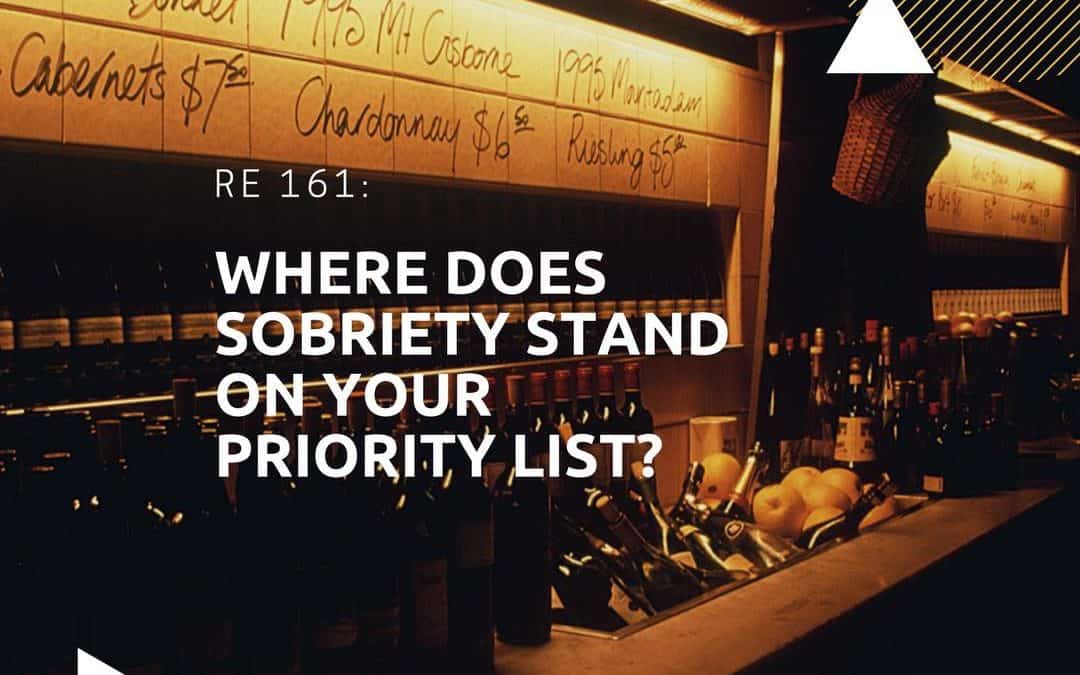
by Paul Churchill | Mar 19, 2018 | Podcast
Podcast: Play in new window | Download
Subscribe to the Recovery Elevator Podcast Apple Podcasts | | More
If you haven’t done so already, make sobriety your number one priority.
It may seem selfish to prioritize yourself over other things, but to really be present and of service to our loved ones and the community at large, we must take care of ourselves. When we root ourselves in something real, concrete and bigger than ourselves, our daily struggles and problems often feel small by comparison.
“Everything’s going to be okay as long as we don’t drink.”
Ryan, with over two since his last drink, shares his story..
SHOW NOTES
[9:10] Paul Introduces Ryan.
Ryan’s been sober for over two years. He decided to quit after a trip to the hospital. He’s from Dallas, TX. Works for an ad agency. Has a 3-year-old son. Has a dog. Is currently focused on raising his son. He and his wife enjoy scuba diving.
[12:45] When did you first notice that you had a problem with drinking?
It began in college. He noticed it affected him differently than other people. He experienced withdrawal symptoms early on after casually drinking. A trip to the doctor put things in perspective for him. The doctor asked him to quit for 30 days, and he realized that he couldn’t stop.
[17:41] What age were you when you realized you had a problem?
Late 20’s.
[18:10] So what happened from late 20’s until now?
He tried many different things. A therapist diagnosed him as depressed. He was medicated. They assumed the problem was something other than alcohol. He drank while medicated and had a psychotic episode. He cut out the medication but kept drinking. He had a week to himself and he drank the whole time. His anxiety increased dramatically. He started hiding his alcohol from his partner.
[23:20] Did things change when your child was born?
Eventually. The morning he found out his wife was pregnant he tried to quit. His drinking got worse. As the due date approached his fear increased. He made sure he had emergency alcohol nearby in case they had to run to the hospital. His worst memory from drinking was being drunk for the birth of his child. He kept drinking after the birth. His wife got involved and tried to help him quit. He continued drinking even while seeing his therapist. Finally went to detox and felt like he was saying goodbye to his best friend. He did an intensive outpatient program. Joined AA. Started working the steps.
[32:05] Talk to us about the time between your treatment and your sobriety date.
He relapsed once. He learned that a relapse happens long before your first drink. He thought he just needed time, but he learned that his thoughts lead to his relapse. He began hiding liquor again. It came back in full force. He realized what he had given up by going back to drinking.
[34:35] So how did you end up quitting again? What is your recovery like today?
The relapse made him realize that he was powerless over alcohol. He stepped up his commitment to AA. He found sobriety groups to be a part of. His family responsibilities fuel his sobriety.
[37:00] What was it like to include your partner in your sobriety?
It was a great decision. It tested the relationship, but they came out stronger. She quit drinking as well.
[39:10] What’s on your bucket list in sobriety?
I just want to be my best.
[39:40] What is your plan in sobriety moving forward?
It’s all about making the next right decision. Focus on what one can control.
[40:45] Rapid Fire Round
- What was your worst memory from drinking?
- Did you ever have an “oh-shit” moment?During his last relapse, he realized “I don’t got this”.
- What’s your plan moving forward?
- What’s your favorite resource in recovery?His family. This podcast is his favorite.
- What’s the best advice you’ve ever received (on sobriety)?“KISS”. Keep it simple stupid.
- What parting piece of guidance can you give listeners who are in recovery or thinking about quitting drinking?If you can do this, you can do anything.. and you can do this. You’re gaining more than you’re giving up.
- You might be an alcoholic if…you end up in the hospital because you didn’t drink.
Resources mentioned in this episode:
Connect with Cafe RE– Use the promo code Elevator for your first month free
Sobriety Tracker iTunes
Sobriety Tracker Android
Sober Selfies! – Send your Sober Selfie and your Success Story to info@recoveryelevator.com
“We took the elevator down, we gotta take the stairs back up, we can do this!”
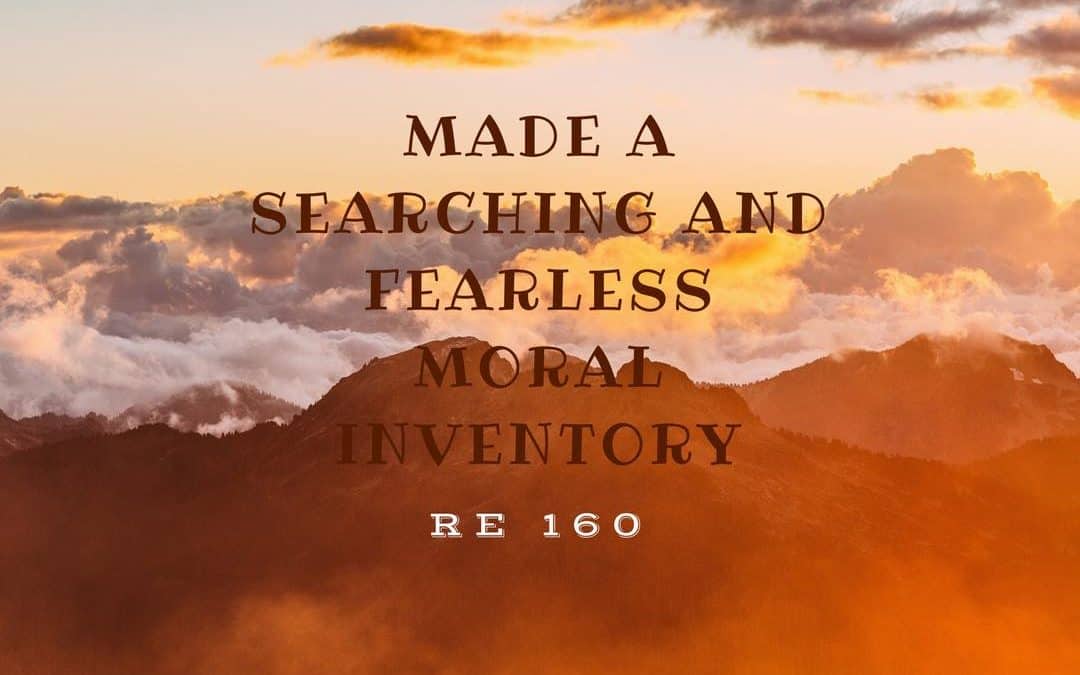
by Paul Churchill | Mar 12, 2018 | Podcast
Podcast: Play in new window | Download
Subscribe to the Recovery Elevator Podcast Apple Podcasts | | More
Step Four – “Made a searching and fearless moral inventory of ourselves”
The Recovery Elevator Podcast isn’t affiliated with Alcoholics Anonymous, but we cover the steps due to listener demand.
For easy lookup:
episode 142 was Step 1
episode 146 was Step 2
episode 152 was Step 3.
The fourth step is probably everyone’s least favorite step, as it involves things we don’t want to do… face our past, our mistakes, our scary thoughts, emotions and current problems. Though it can be scary, it is still one of the most important steps in recovery. Alcoholism is merely a symptom of underlying inner conflict, delusions and/or flaws in our character that need to be faced, and where possible, overcome.
The key is honesty. While working step four, we get a new perspective on the bigger picture and see ourselves and our behavior in a new way that helps us to move forward without fear and allows us to embrace a healthy self-image.
This step is all about bringing unconscious behavior to light. We gradually realize that only we can change, and not change others. This step is meant to be done with your sponsor.
Kerry, with 12 days since her last drink, shares her story…
SHOW NOTES
[13:25] Paul Introduces Kerry.
Kerry lives in Los Angeles, is 47 years old, is married, has two children and four dogs. She loves reading, the movies, traveling, and book stores.
[17:40] When did you first realize that you had a problem with drinking?
In her 40’s. She started in her teens, and as an adult, she drank daily. She struggled to stay sober while she was pregnant. Her drinking ramped up after her second child, in her 40’s. She thought her drinking was normal, so she found it hard to believe she had a problem.
[22:00] What were some of the rules you put in place?
She tried to only have a glass of wine with dinner, but it didn’t work. She tried to insert a glass of water between each glass of wine. The rules didn’t work, which only made her feel down on herself.
[25:00] When was your first attempt to quit?
2 and ½ years ago. Her friends invited her to AA meetings. She “white knuckled it” about three weeks. Relapsed. This added more shame, which leads to more drinking. She kept trying and has been in and out since then.
[27:20] Was there one moment that changed it for your or was you generally sick and tired?
She was sick and tired. She became ashamed when her daughter witnessed her really drunk.
[29:00] What are some of the things in your recovery portfolio and what will you do to make it stick this time?
She wakes up early and meditates. She reads a chapter of “Living Sober” every day. She reaches out to sober friends. She goes to meetings occasionally.
[32:49] What benefits do you see with 12 days in sobriety?
More energy. Better sleep. No hangovers. Being more aware and present for her kids. Better memory.
[34:41] How are you overcoming the internal dialogue that is trying to convince you to drink?
She knows it’s her addiction talking and it helps her to compartmentalize the thought. She uses meditation techniques to let it pass.
[36:40] How has it been with your husband?
He’s been supportive. He also thought she was drinking too much. He’s compassionate and helpful.
[40:35] What’s on your bucket list in recovery?
She loves traveling. She intends to use the money saved by not drinking to fund a trip to Amsterdam. She wishes to be more present for herself and her family.
[43:10] Rapid Fire Round
- What was your worst memory from drinking?
Before she got married, she went to a dinner party and got drunk. She left the party without telling anyone, and she threw up on the subway.
- Did you ever have an “oh-shit” moment?
Her husband noticed that she was slurring her words and pulled aside to ask her to stop drinking.
- What’s your plan moving forward?Keep up with the morning meditation. More meetings. Find a sponsor and work the steps.
- What’s your favorite resource in recovery?She likes reading other people’s stories. She’s reading the books by Caroline Knapp and Sarah Hepola. (See mentioned resources below)
- What’s the best advice you’ve ever received (on sobriety)?
“Follow the drink to the end”. One glass isn’t just one glass.. it ends up with her throwing up and a terrible hangover.
- What parting piece of guidance can you give listeners who are in recovery or thinking about quitting drinking?Just do it. Start today. Don’t set a date, just do it today.
- You might be an alcoholic if…Y
ou open a bottle of wine, pour out two glasses and pour the rest down the drain. Then, after you’ve had the two glasses, you go out to the liquor store and buy more wine to keep drinking.
Resources mentioned in this episode:
Recovery: Freedom from Our Addictions – A book by Russell Brand
Living Sober – an introduction to AA and recovery.
Blackout: Remembering the Things I Drank to Forget – by Sarah Hepola
Drinking: A Love Story – by Caroline Knapp
Connect with Cafe RE– Use the promo code Elevator for your first month free
Sobriety Tracker iTunes
Sobriety Tracker Android
Sober Selfies! – Send your Sober Selfie and your Success Story to info@recoveryelevator.com
“We took the elevator down, we gotta take the stairs back up, we can do this!”







